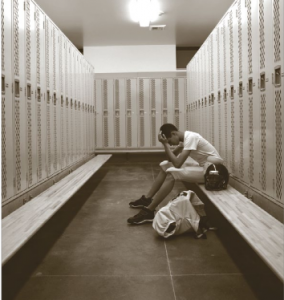Around August of last year, I tore my ACL weeks before the start of my senior soccer season. My injury left me feeling sad and upset that I could no longer play soccer, however those emotions quickly went away as I focused my mind on having a speedy recovery. A few weeks later I underwent ACL reconstruction surgery and was physically handicapped for many weeks to the point of where I could not bend my knee. Now, over a year later, I have made a full recovery and am perfectly healthy. While the recovery process was physically hard, I made it through it mentally because I had ways of entertaining myself other than playing soccer. However, I began to think about other athletes who suffer from severe injuries whose sport is their entire life. In this blog I am going to examine the psychological effects of injuries on athletes.
It has been found that when an athlete suffers from a serious sports injury they also suffer from many physiological effects that come with it. One of the biggest things that injured athletes struggle with is depression. Because the injury prevents the athlete from doing what they love, they become lost and don’t know what to do with themselves, and often times go into depression. A study conducted looked at the psychological effects of an injury on 343 male college athletes. The results of the study were that nearly half of the athletes had symptoms of depression, and in addition to this 12% of the athletes actually became depressed. While this study shows support for the hypothesis that injuries cause depression, it would have been more credible had it been conducted with a larger number of participants and conducted on females in addition to males. Nonetheless, it is believed that injuries can lead to an athlete coming depressed.
Along with depression, one of the biggest controversies in the sports world has been the psychological effects caused by concussions. It is said that suffering from a concussion can lead to the development of Chronic Traumatic Encephalopathy, aka CTE.
CTE is said to lead to brain degeneration, which means a person can develop memory loss, impaired judgement, depression along with many other changes to behavior. What is scary about CTE is that symptoms often do not show up right away, and can even show up year later. CTE shows that injuries not only bring about psychological changes during the recovery process of the injury, but they can bring about psychological effects years after the person has completely recovered from their injury.
While small injuries might not have any mental health on athletes, large chronic injuries certainly do. Some people may not be affect at all by their injury, whereas others will be mentally damaged. Why is it that some people are more affected than others? First, it may depend on the type of injury. Head injuries are more likely to bring on depression and personality changes than knee injuries. Also, a person’s family history may contribute. If somebody has a family history of depression, they may be more likely to suffer depression when they become injuries than somebody who has no family history of depression. All in all, while it may seem like injuries only have physical effects, they also have large psychological effects.
Sources:
Putukian, By Margot. “Mind, Body and Sport: How Being Injured Affects Mental Health.” NCAA.org. N.p., 10 Nov. 2014. Web. 20 Oct. 2016.
“What Is CTE? » CTE Center | Boston University.” CTE Center RSS. N.p., n.d. Web. 20 Oct. 2016.
Tarkin, Laurie. “Athletes’ Injuries Go Beyond the Physical.” The New York Times. N.p., 26 Sept. 2000. Web. 20 Oct. 2016.


I thought this blog post was really interesting, not because I can relate, but pretty much the same exact scenario happened to my boyfriend. He tore his ACL senior year and missed out on our basketball team winning the state championship. I know this is kind of a drastic case, but it really made him depressed. Sitting on the bench and watching his friends and teammates do what he so desperately wanted to do was really torturous, and he eventually went to a sports psychologist about his depression. I think this is something that is common amidst people with injuries, such as an ACL tear, that sideline them for so long. Here is an article I found that discusses the mental effects of an injury, which not only includes depression, but fear of re-injury, anxiety, and more: https://www.crossfitinvictus.com/blog/coping-with-injury-the-psychology-of-being-sidelined/
This is a very interesting article on a topic that does not get enough attention that maybe needs too. I suffered a concussion in middle school which halted my ability to play basketball, but luckily I had a speedy recovery and was back playing, ready for next season. I think for many athletes that rely heavily on sports for academic scholarships or have visions of going pro, an injury would leave an impact on them that might cause them to become depressed. An article by the NCAA lists all the possible and common side affects that come with a student athlete getting injured, and sadness is the first one.
http://www.ncaa.org/health-and-safety/sport-science-institute/mind-body-and-sport-how-being-injured-affects-mental-health
This is a good blog post, and I know form experience that this is true. My brother was a pitcher for Maryland University. In his junior year he hurt his shoulder at practice, and ended up having to get surgery on it. After the surgey he was not the same mentally. We all knew he would be depressed, but it got really bad. He would not talk to people, skip classes, and would barely eat. Some classic signs of depression. After a few weeks he got out of it once he started rehab. Even though this study had a small sample, it is pretty on point to depression after injuries.
http://www.nytimes.com/2000/09/26/health/athletes-injuries-go-beyond-the-physical.html
This topic has a very personal pull for me. A boy from my school committed suicide in his junior year of high school, but his depression was attributed to the multiple concussions he had sustained while playing hockey. It has been documented over and over just how detrimental concussions can be on someone’s brain, so it was interesting to read about the effects of other sports related issues.
If you’re interested in learning more about this topic, the movie Concussion featuring Will Smith was a pretty good watch!